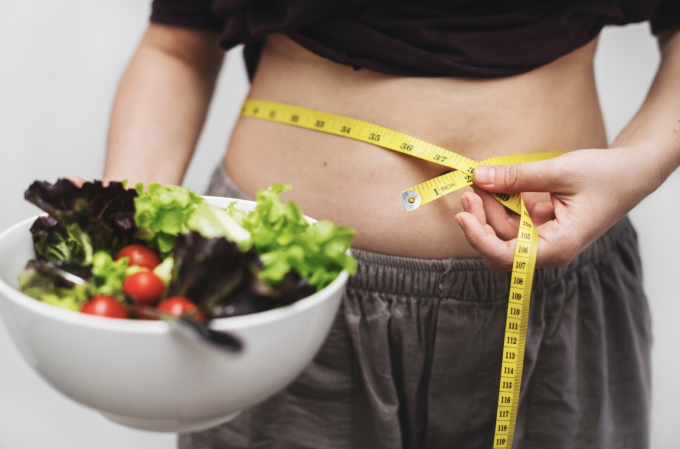Reducing calories by 300 kcal per week, maintaining a varied diet prioritizing fruits and vegetables, cutting down on carbohydrates and sugar, and avoiding late-night eating can help you lose weight after Tet.
Many people tend to gain weight after the Lunar New Year due to less restrictive eating habits and a lack of exercise. Maintaining a healthy weight helps stabilize health and reduce the risk of related diseases. On average, losing 5-10% of body weight can regulate many metabolic disorders associated with obesity, such as hypertension, dyslipidemia, and type 2 diabetes.
Dr. Tran Thi Tra Phuong, from the Nutrihome Nutrition Clinic System, stated that changing diet and physical activity are fundamental to weight loss. The general principle is to reduce calorie intake and improve the quality of meals. Those wishing to maintain their figure can gradually reduce calorie intake by cutting 300 kcal per week compared to their current level (until they reach the appropriate energy level for weight loss).
Specifically, for those wanting to lose weight with a body mass index (BMI) of 25-29.9, the recommended daily energy intake is 1,500 kcal. If BMI is 30-34.9, the required intake is approximately 1,200 kcal per day. For BMI between 35-39.9, the intake is 1,000 kcal per day. Those with a BMI of 40 or higher should only consume around 800 kcal per day.

A healthy diet is the foundation for safe weight loss. Photo: Freepik
A balanced diet should include a variety of foods. Eat plenty of green vegetables and soup, and drink water before meals to avoid feeling excessively hungry, which can lead to excessive carbohydrate consumption. Choose whole foods rich in fiber such as potatoes, green vegetables, and fresh, low-sugar fruits (dragon fruit, plums, apples, grapefruit, etc.) to supplement easily digestible vitamins and minerals, prevent constipation, and promote satiety. Fruits should be eaten in pieces or segments, and the peel can be consumed whole, rather than being juiced.
Limit fried and stir-fried dishes; cook with less oil and fat. Avoid animal skin and organs, and prioritize lean meats. Chew your food thoroughly and avoid skipping meals, as hunger will lead to overeating at subsequent meals, causing faster fat accumulation.
People who want to lose weight should eat more in the morning and avoid snacking; drink unsweetened, fat-free milk (skim milk) to still ensure calcium needs are met without providing a lot of energy.
Avoid sugary soft drinks, carbonated drinks, and sweetened condensed milk; limit cakes, candies, and jams. Avoid eating late at night before bed. Exercise and lifestyle are also very important; those trying to lose weight need to establish a schedule and exercise regularly to quickly regain a healthy weight.
Doctor Tra Phuong suggests the following sample meal plan providing approximately 1,500 kcal:
| Mealtime | Dish |
| 7am | Beef pho: 150g rice noodles, 35g beef, 10g scallions Broth (1 g salt in 100 ml) Unsweetened skim milk: 180 ml |
| 12h | White rice: 150 g (75 g of rice) Roasted pork: 50 g lean pork Blanched tofu: 30 g tofu Stir-fried bok choy: 200 g bok choy, 7 ml cooking oil Malabar spinach soup: 50 g Malabar spinach Grapefruit: 200 g (three segments) |
| 3 PM | Unsweetened skim milk: 200 ml |
| 6 PM | White rice: 120 g (60 g of rice) Fried carp in tomato sauce: 70 g carp, 30 g tomatoes, 10 ml cooking oil Boiled eggs: 25g of eggs (1/2 a chicken egg) Boiled water spinach: 200 g water spinach Sweet potato leaf soup: 50 g sweet potato leaves Tangerine: 120 g (one fruit) |
| Nutritional value | Energy: 1,464 kcal Protein: 73.3 g Carbohydrates: 200 g Fat: 41 g Calcium: 1,200 mg Iron: 14.1 mg Zinc: 9.2 mg Fiber: 11.3 g Sodium: 383 mg Potassium: 3,097 mg Cholesterol: 190 mg |
| Note | Salt intake should be less than 4.5g per day. |
Kim Thu
| Readers can submit their nutrition questions here for the doctor to answer. |
Source link




![[Photo] Prime Minister Pham Minh Chinh working with the Vietnam Academy of Science and Technology](https://vphoto.vietnam.vn/thumb/1200x675/vietnam/resource/IMAGE/2026/02/23/1771832245861_image-2-6431-jpg.webp)

![[Photo] General Secretary To Lam meets with and extends New Year greetings to the Central Party Office.](https://vphoto.vietnam.vn/thumb/1200x675/vietnam/resource/IMAGE/2026/02/23/1771822040571_a1-bnd-6844-9653-jpg.webp)

![[Photo] Nhan Dan Newspaper's New Year's gathering in the year of the Horse 2026](https://vphoto.vietnam.vn/thumb/1200x675/vietnam/resource/IMAGE/2026/02/23/1771825639110_gap-mat-dau-xuan1-8272-jpg.webp)










































































































Comment (0)